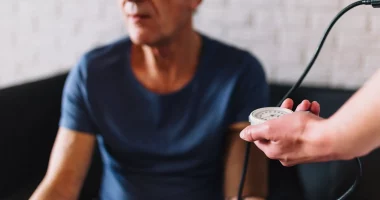Anosmia is when someone can’t smell things. Some people are born with this, and some people find that they can no longer smell as they get older.
Experts think that between 3% to 20% of people have anosmia or hyposmia, which is when your sense of smell is weaker than normal.
People sometimes call anosmia as smell blindness. It might stick around forever, or it could go away after a while.
Smelling is complicated. When you sniff something, air goes into your nose, and the smell molecules attach to special nerves in your nose called the olfactory nerve.
These nerves are in the olfactory epithelium, which is just a fancy name for the tissue inside your nose. When these nerves get tickled by smell molecules, they send messages to your brain.
Your brain takes these messages and figures out what smell they represent.
Symptoms
When someone gets anosmia, they might realize they can’t smell things they used to. But if someone was born with anosmia because of their genes, they might not even know they have it because they had an inability to smell.
Some diseases like Parkinson’s or Alzheimer’s can also make you lose your sense of smell. If someone with these diseases notices they can’t smell anymore, they should see a doctor right away. Sometimes, losing your sense of smell is the first sign that something’s wrong.
When you can’t smell anymore, you might miss important smells, like the warning scent of spoiled food or dangerous fumes. People with anosmia might find it harder to enjoy eating and hanging out with others, and they might feel less happy overall.
Causes
Inherited anosmia
Inherited anosmia is when someone is born with it. If there are no other health issues involved, it’s called isolated congenital anosmia (ICA). However, researchers have only found two genes linked to ICA. More research is needed to understand this condition better.
Aging
As people get older, their sense of smell tends to decrease. They might also find it harder to tell different smells apart. This could be because of fewer nerve fibers and receptors in the part of the brain that deals with smells, loss of sensory cells in the nose, or problems with how the brain processes smell.
Chronic sinonasal diseases
Chronic sinonasal diseases can be split into two types: conductive and neurosensorial.
Conductive diseases affect airflow and can include things like nasal polyps, tumors, allergic rhinitis (hay fever), or septal deviation.
Neurosensorial diseases affect the nerves between the nose and the brain. Dysfunction or damage along this pathway can be caused by conditions like viral illnesses or toxin inhalation. About 43% of cases of neurosensorial olfactory loss can be linked to upper respiratory infections, and tumors can also cause this type of anosmia. Toxins like tobacco, drugs, or toxic vapor can also contribute to anosmia.
Neurodegenerative diseases
Certain neurodegenerative diseases, like Parkinson’s or Alzheimer’s, can lead to anosmia or a reduced sense of smell. Other diseases like Huntington’s disease or amyotrophic lateral sclerosis can have the same effect.
Sometimes healthcare providers can’t figure out why someone has anosmia. When this happens, it’s called idiopathic anosmia.
Diagnosis
During routine health check-ups, doctors usually don’t test a person’s sense of smell. Instead, they rely on patients to tell them if they’ve noticed any modifications in their ability to smell.
However, relying solely on self-reports may not catch everyone with anosmia. Some people might not even realize they can’t smell anymore.
To improve how doctors diagnose anosmia, they could update health questionnaires. These questionnaires could ask people of all ages about any changes in their sense of smell and if they’ve noticed any strange smells that aren’t really there.
One useful tool for screening anosmia is the National Health and Nutrition Examination Survey (NHANES) self-reported olfactory function index. This survey helps doctors identify people who might have anosmia based on their answers.
If someone reports problems with their sense of smell through this survey, doctors can then arrange further tests to confirm the diagnosis.
Treatment
When doctors decide how to help someone with anosmia, they need to know what caused it.
For people with genetic disorders, treatments like cell and genetic therapies might be worth looking into. If someone has anosmia after an infection, their doctor might suggest taking zinc gluconate supplements or doing smell training.
Smell training means smelling four different scents really hard twice a day for a few seconds, for at least 4 months. It might work better if they smell different scents each day for a long time. For those whose anosmia came from a head injury, smell training could also be helpful.
Sometimes, surgery or corticosteroid drugs are the only options for people with anosmia from nose problems. Doctors might give corticosteroids through the nose or as pills to help manage anosmia.
Research has shown that nose corticosteroids can help with allergic rhinitis, especially when taken with antihistamines through the nose. Pills can also work for anosmia, but doctors aren’t sure yet how much to give or for how long.
It’s hard for doctors to say if surgery will help with anosmia, but for some people, sinus surgery might make it better.
Sometimes, anosmia goes away on its own without treatment, especially after an upper respiratory infection. Sadly, some people with anosmia struggle to get the right care. Part of the problem is that they might not realize they have a problem with their sense of smell.
Complications
Living with anosmia can make life harder. Not being able to smell might affect how close someone feels to their partner because smelling each other is part of being close.
It can also make eating less fun when you can’t smell your food.
Anosmia can even be dangerous. Usually, our sense of smell helps us notice dangers like gas leaks or smoke. It also stops us from eating spoiled food or drinking harmful liquids by accident.
For people with Parkinson’s or Alzheimer’s, anosmia can cause even more problems. It might make it harder for them to eat well, stay safe, and live longer.
When to Consult a Doctor
If you notice you can’t smell things like you used to, it’s a good idea to talk to a doctor. They can figure out why it’s happening and suggest ways to help. Treatment could involve things like cell therapy, medications, smell training, or even surgery, depending on what’s causing the problem.
If you think you might have been around someone with COVID-19 or have symptoms of the virus, like loss of smell, it’s important to stay away from others and call your local health department for advice on what to do next.
Summary
Losing your sense of smell might not seem like a big deal, but it can lead to serious problems.
Smell helps us stay safe by letting us know if something is dangerous, like gas leaks or spoiled food. People who can’t smell lose this warning system.
The smell also adds joy to life. Being able to smell tasty food, the fresh outdoors, or the special scents of close moments makes life richer. People who lose their sense of smell might not enjoy these things as much.
Doctors know a few reasons why someone might lose their sense of smell. Some causes can make the loss permanent, while others might get better with time. To treat it properly, doctors need to know what’s causing it in the first place.









